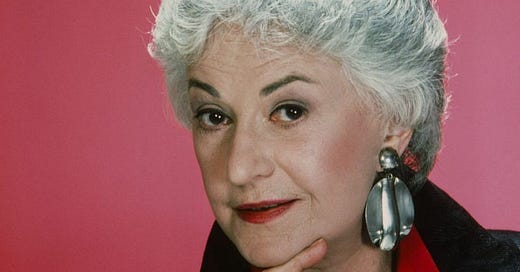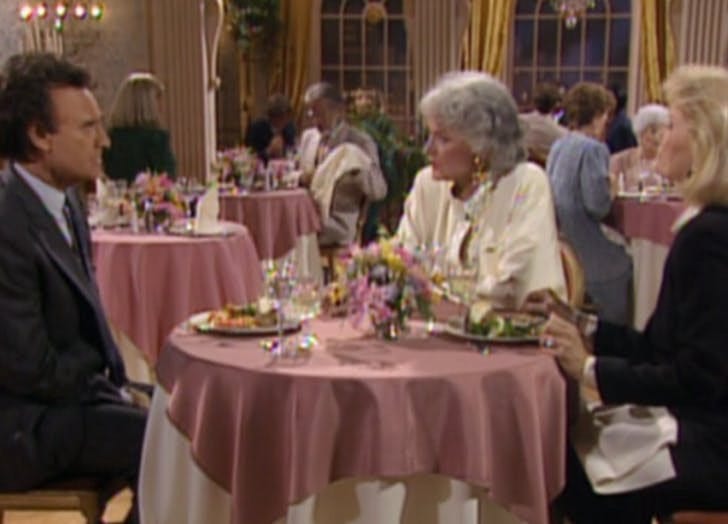That Time Dorothy Zbornak Told off a Mansplainer
She said what so many have wanted to say.
I love The Golden Girls, both the show that ran from 1985-1992 and the girls themselves. I have a particular fondness for Sophia, but I truly love them all.
I have always appreciated Dorothy’s honesty. She’s never shy to tell someone when they’re being stupid (Rose), when they’re being inconsiderate (Blanche), or when they’re being reckless (Sophia). She’s always quick-witted and often full of answers.
That’s what made the beginning of Season 5 so upsetting. In the two part series opener, Dorothy feels physically ill. She’s been constantly exhausted for months and it’s not getting better. She knows something is wrong with her, but no one can diagnose her pains.
Or do they just not believe her?
“In the medical industry, there’s a long history of dismissing women’s pain.” Jennifer Billock, BBC
There have been countless studies performed that measure gender inequality in the health care community. Men disproportionately receive better and more accurate care than women. Part of this is due to the fact that white, heterosexual men have long been considered the standard for human anatomy for centuries.
In a 2008 study, María José Barral of the University of Zaragoza found that white male anatomy dominated a considerable amount of Human Anatomy textbooks with three times as many males bodies being used in illustrations than female bodies. The researcher has been quoted as saying,
“Medical research in terms of the diagnosis, treatment and prevention of diseases has been focused on this model of white, heterosexual men, who are a minority on this planet, and this does not reflect true diversity.”
Disparities in medicinal care are common and have been known in the industry for some time as the “gender pain gap.” In 2016, Siobhan Fenton, Health and Social Affairs Correspondent for Independent, wrote about how women receive less pain medicine than men, wait longer in emergency rooms, and are often dismissed as irrational or emotional. She writes, “Clinical studies have also found that doctors are more likely to think women’s pain is caused by emotional issues rather than physical causes, even in the presence of clinical tests which show their pain is real.”
The Golden Girls was never a show to shy away from sensitive and sometimes controversial topics. Over cheesecake, the ladies discussed the HIV/AIDS epidemic, age discrimination, drug addiction, immigration, and same-sex marriage.
When it was time to face gender discrimination in pain treatment, they didn’t hold back any punches.
Dorothy is dismissed by every doctor she meets in the first episode. She visits Dr. Budd and explains her symptoms of a constant sore throat, fevers, and swollen glands. He offers depression as a possible explanation and tells Dorothy that maybe she’s just getting old. None of those symptoms are symptoms of depression or aging and are all actually symptoms of Chronic Fatigue Syndrome (CFS), her eventual diagnosis. The CDC first defined this disease two years before the episode aired.
When she visits another doctor, the following conversation ensues:
Dorothy: I’ve been sick for 5 months now. I have a constant sore throat, swollen glands, fevers, my muscles ache and are weak. I am totally exhausted all the time.
Dr. Stern: I know, I know. You told me.
Dorothy: Well maybe it bears repeating!
Another doctor dismisses her.
In the second episode, Dorothy meets with her friend Harry, who is a doctor. We, the audience, trust Harry — a neighbor of the girls who is always kind and helpful. He’s a recurring character and even got his own spinoff show, Empty Nest. It took this umpteenth doctor, her personal friend, to finally claim his ignorance, say he just doesn’t know, and recommend her to a specialist.
When she visits the specialist, Dr. Chang, she is finally diagnosed with Chronic Fatigue Syndrome. He explains that although the disease has only recently been discovered, that does not excuse the previous doctors’ dismissals of her symptoms. He gives her some helpful advice, orders some blood tests, and calms her nerves. Dorothy is so relieved to hear that there is a real disease that explains her symptoms — but she can’t let go of the fact that the other doctors didn’t seem to care. Dr. Chang responds, “I’m sure someone of them weren’t familiar with it. And the ones who have heard about it sometimes have trouble believing it exists since they’re not able to see it under their microscopes just yet. Those colleagues of mine, unfortunately, tend to blame the victim.”
Dorothy’s so thrilled to be alive and well that she takes the ladies out to dinner, spending $400 on a bottle of champagne in the process. In the middle of the celebration, she notices Dr. Budd, one of the doctors who dismissed her, dining at another table. She can’t help but interrupt his meal to deliver one of the strongest, most defiant monologues in television history. And one of my favorite tv moments of all time.
She says what so many have wanted to say:
Dr. Budd, I came to you sick. Sick and scared. And you dismissed me. You didn’t have the answer. And instead of saying, “I’m sorry. I don’t know what’s wrong with you,” you made me feel crazy, like I had made it all up. You dismissed me. You made me feel like a child, a fool, a neurotic who was wasting your precious time. Is that- Is that your caring profession? Is that healing? No one deserves that kind of treatment, Dr. Budd, no one. I suspect, had I been a man, I might have been taken a little bit more seriously and not told to go to a hairdresser. I don’t know where you doctors lose your humanity, but you lose it. You know, if all of you at the beginning of your careers could get very sick and scared for a while, you’d probably learn more from that than anything else. You’d better start listening to your patients. They need to be heard. They need caring, they need compassion. They need attending to. You know, someday, Dr. Budd, you’re gonna be on the other side of the table, and as angry as I am, and as angry as I always will be, I still wish you a better doctor than you were to me.







